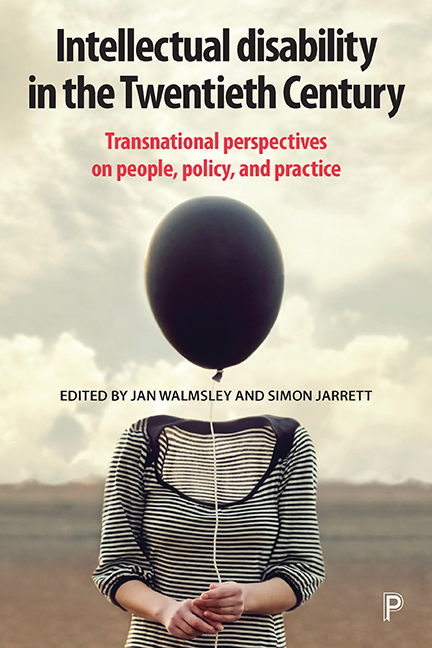 Intellectual Disability in the Twentieth Century
Intellectual Disability in the Twentieth Century Book contents
- Frontmatter
- Contents
- Notes on editors and contributors
- Introduction
- one Paradoxical lives: intellectual disability policy and practice in twentieth-century Australia
- two Tracing the historical and ideological roots of services for people with intellectual disabilities in Austria
- three Time of paradoxes: what the twentieth century was like for people with intellectual disabilities living in Czechoslovakia/Czech Republic
- four Intellectual disability in twentieth-century Ghana
- five A Greek Neverland: the history of the Leros asylums’ inmates with intellectual disability (1958–95)
- six Intellectual disability in Hong Kong: then and now
- seven People with intellectual disabilities in the European semi-periphery: the case of Hungary
- eight People with intellectual disabilities in Iceland in the twentieth century: sterilisation, social role valorisation and ‘normal life’
- nine Institutionalisation in twentieth-century New Zealand
- ten ‘My life in the institution’ and ‘My life in the community’: policies and practice in Taiwan
- eleven Intellectual disability policy and practice in twentieth-century United Kingdom
- twelve From social menace to unfulfilled promise: the evolution of policy and practice towards people with intellectual disabilities in the United States
- Index
eleven - Intellectual disability policy and practice in twentieth-century United Kingdom
Published online by Cambridge University Press: 27 April 2022
- Frontmatter
- Contents
- Notes on editors and contributors
- Introduction
- one Paradoxical lives: intellectual disability policy and practice in twentieth-century Australia
- two Tracing the historical and ideological roots of services for people with intellectual disabilities in Austria
- three Time of paradoxes: what the twentieth century was like for people with intellectual disabilities living in Czechoslovakia/Czech Republic
- four Intellectual disability in twentieth-century Ghana
- five A Greek Neverland: the history of the Leros asylums’ inmates with intellectual disability (1958–95)
- six Intellectual disability in Hong Kong: then and now
- seven People with intellectual disabilities in the European semi-periphery: the case of Hungary
- eight People with intellectual disabilities in Iceland in the twentieth century: sterilisation, social role valorisation and ‘normal life’
- nine Institutionalisation in twentieth-century New Zealand
- ten ‘My life in the institution’ and ‘My life in the community’: policies and practice in Taiwan
- eleven Intellectual disability policy and practice in twentieth-century United Kingdom
- twelve From social menace to unfulfilled promise: the evolution of policy and practice towards people with intellectual disabilities in the United States
- Index
Summary
This chapter attempts an overview of the dense and complex history of intellectual disability in the United Kingdom in the twentieth century. Inevitably much of it focuses on legislation and policy emanating from the dominant Westminster parliament and its civil service apparatus. For the first half of the century, we concentrate on the legislative and policy environment in England and Wales, and for the second, mainly on England. Readers seeking a more detailed account, including of developments in Wales, Scotland and Northern Ireland, are referred to Welshman and Walmsley's Community Care in Perspective (2006).
We begin with a summary of late-nineteenth-century changes in thought and perspective that laid the groundwork for the radical measures adopted in the early twentieth century. We then focus on the period from 1904 to 1948, dominated by the Mental Deficiency Act 1913, arising from the 1904 Royal Commission on the Care and Control of the Feeble-Minded. The final part covers the period from 1948 to 2001 and sets out the main developments in learning disability policy before telling the story through the lives of four people whose lives span the period.
The paucity of first-hand life stories in the pre-Second World War period is in marked contrast to their emergence in the latter part of the century. This in itself tells a story of at least one way in which change happened, between the controlling and excluding era of the Mental Deficiency Act and movements towards civil liberty in the latter part of the century.
Changing perceptions in the late-nineteenth and early-twentieth century
Radical changes in perception about ‘idiocy’ emerged in the latter part of the nineteenth century. A small group of ‘idiot asylums’ were established across the country from the 1850s. These were charitable institutions aimed more at the children of the middle classes than the poorer masses, and small in scale. However, in 1867 the Metropolitan Poor Act established a Metropolitan Asylums Board and by the 1870s three large ‘imbecile asylums’ had been established, each housing around 1,000 people, the ‘idiot’ offspring of the London poor (Thomson, 1998, 12–13). The locus of care was switching decisively from the family to the institution, from charitable initiatives to the state, although there never was a move to total institutionalisation. There was always a mixed economy of care, in which families played a prominent role.
- Type
- Chapter
- Information
- Intellectual Disability in the Twentieth CenturyTransnational Perspectives on People, Policy, and Practice, pp. 177 - 194Publisher: Bristol University PressPrint publication year: 2019


